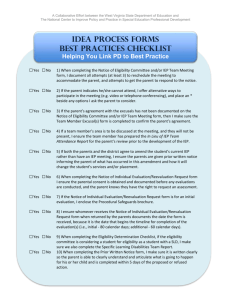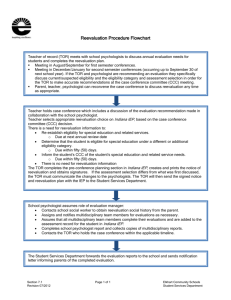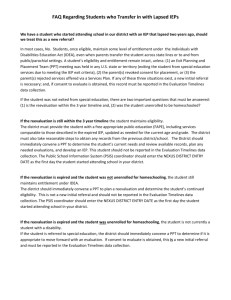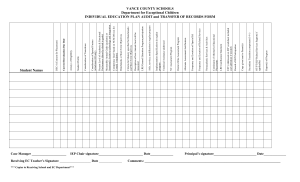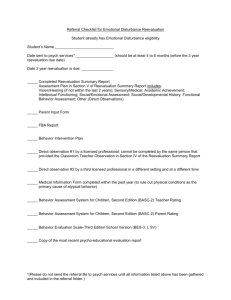Section 7 Reevaluation
advertisement
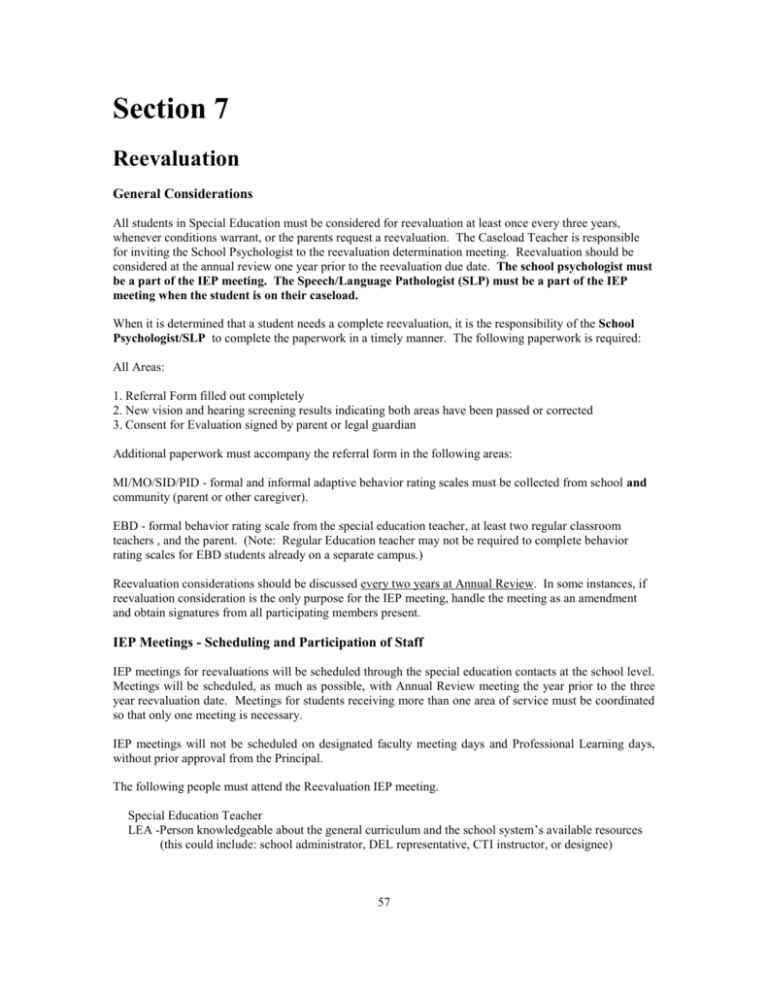
Section 7 Reevaluation General Considerations All students in Special Education must be considered for reevaluation at least once every three years, whenever conditions warrant, or the parents request a reevaluation. The Caseload Teacher is responsible for inviting the School Psychologist to the reevaluation determination meeting. Reevaluation should be considered at the annual review one year prior to the reevaluation due date. The school psychologist must be a part of the IEP meeting. The Speech/Language Pathologist (SLP) must be a part of the IEP meeting when the student is on their caseload. When it is determined that a student needs a complete reevaluation, it is the responsibility of the School Psychologist/SLP to complete the paperwork in a timely manner. The following paperwork is required: All Areas: 1. Referral Form filled out completely 2. New vision and hearing screening results indicating both areas have been passed or corrected 3. Consent for Evaluation signed by parent or legal guardian Additional paperwork must accompany the referral form in the following areas: MI/MO/SID/PID - formal and informal adaptive behavior rating scales must be collected from school and community (parent or other caregiver). EBD - formal behavior rating scale from the special education teacher, at least two regular classroom teachers , and the parent. (Note: Regular Education teacher may not be required to complete behavior rating scales for EBD students already on a separate campus.) Reevaluation considerations should be discussed every two years at Annual Review. In some instances, if reevaluation consideration is the only purpose for the IEP meeting, handle the meeting as an amendment and obtain signatures from all participating members present. IEP Meetings - Scheduling and Participation of Staff IEP meetings for reevaluations will be scheduled through the special education contacts at the school level. Meetings will be scheduled, as much as possible, with Annual Review meeting the year prior to the three year reevaluation date. Meetings for students receiving more than one area of service must be coordinated so that only one meeting is necessary. IEP meetings will not be scheduled on designated faculty meeting days and Professional Learning days, without prior approval from the Principal. The following people must attend the Reevaluation IEP meeting. Special Education Teacher LEA -Person knowledgeable about the general curriculum and the school system’s available resources (this could include: school administrator, DEL representative, CTI instructor, or designee) 57 General Education Teacher. At least one general education teacher must attend each IEP meeting. Person who can interpret the instructional implications of evaluation results (psychologist, special education teacher) Parents Students who will be entering ninth grade or who are age 16 or older must be invited. Parent Rights must be offered to the parent at least one time each year AND at initial referral for an evaluation AND when requested by parents as well as upon district receipt of the first state complaint, district receipt of the first due process complaint, or on the date on which the decision is made to make a removal that constitutes a change of placement of a child with a disability because of a violation of a code of student conduct. Parent Rights will be attached to the first notice that is sent to the parent(s) for 2011-2012 school year. This date will be documented on Page 6 of the IEP. Procedures A Reevaluation involves all of the procedures required for initial placement. When determining eligibility for special education services and/or determining the appropriate educational program for a student with a disability, it is important (and required by Federal Regulation) that the team not use any single measure of assessment as the sole criterion in their decision making process. Parents must be invited to participate in Eligibility meetings and must sign-off on the Eligibility Report. Reevaluation must be considered at least every 3 years. The anniversary date is the date on the last eligibility report or the IEP date in which it was determined no additional testing was needed. The consideration for additional testing should occur at the annual review one year prior to the anniversary date. Consent for reevaluation must be obtained from parents before any testing takes place. In the IEP Meeting A new IEP form must be completed for all IEP meetings and the old IEP is archived. Any changes in placement or amount of service must be discussed. Promotion/Retention Promotion or retention may be discussed at an initial placement but must be discussed at the Annual Review meeting. Immediately Following the IEP Meeting 1. Assemble all Annual Review paperwork in the following order (top to bottom): a. GA Supplemental b. New IEP in order of Page 1and 6 plus any page written on or not in SEAS IEP; report card; Notice of Annual Review (stapled) 2. Check all paperwork for correctness and completion. No Blanks! 3. Submit the paperwork to the Office for the Division for Exceptional Learning for administrative review within 2 days of the meeting. If the Annual Review Meeting is also a REEVALUATION CONSIDERATION MEETING, the reevaluation sheet must be stapled to a copy of the most recent eligibility and placed on top of the above packet and forward to DEL. If the student is found to be ineligible to continue to receive special education services, a copy of the last psychological and or speech information will be forwarded by the school psychologist/SLP to the RTI Team (Level 2) at the school. 58 Speech Impaired Reevaluation Reevaluations for Speech Impaired students must be considered at least every three years. It is the responsibility of each SLP to: 1. Request a vision and hearing screening and keep a copy of the screening report 2. Obtain Consent to Evaluate from the parent 3. Complete an evaluation of articulation, voice, fluency, oral motor functioning and language with indepth testing using at least two measures in the area(s) of suspected deficit (i.e. two tests for syntax or semantics, etc.) and an SLP interview/observation sheet for all students who qualify for speech services 4. Document negative educational impact on eligibility report in each qualifying area 5. Schedule meetings with the Contact Person 6. Follow the general reevaluation procedures outlined in this section Referral Procedures for School Psychologist/SLPs All students referred for evaluations are entitled to a comprehensive evaluation. This evaluation may include both Psychological testing and Speech/Language testing. Periodically, School Psychologists and SLPs may have to refer students to each other. If a student is already in the Speech-Language Impaired Program and requires Psychological testing, the SLP will follow the procedures listed: Contact the School Psychologist to discuss the student Schedule a Reevaluation Consideration Meeting and invite the School Psychologist Gather/provide the data concerning interventions and data Schedule the amendment meeting to discuss the Reevaluation If the student is an initial referral for either the School Psychologist or SLP and needs to be referred to the other professional for testing, the person who took the initial referral will do as follows: Ensure there is ample time to conduct an evaluation—at least 3-4 weeks remaining in the 60 day timeline. Any referrals not having 3-4 weeks left in the 60 day timeline will be brought to a DEL director and the Director will contact the School Psychologist/SLP to do the testing. Contact the School Psychologist/SLP to discuss the student Provide a copy of the passed Hearing/Vision Report and signed Consent for Evaluation Form Share any intervention data applicable to the evaluation If School Psychologist is referring to SLP, the Psychologist will inform the caseload teacher that the SLP needs to be invited to the IEP meeting in a timely manner. If SLP is referring to the School Psychologist, the SLP will invite the School Psychologist to the IEP meeting in a timely manner. Neither the School Psychologist nor the SLP can refuse to evaluate a student referred to them for testing. Any problems during these procedures should be brought to the attention of a DEL Director. 59
